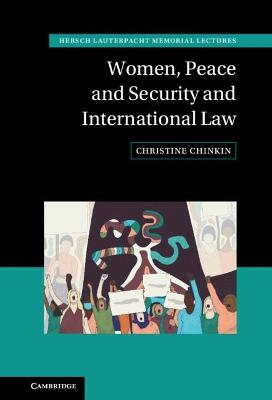
Women, Peace and Security and International Law
Seiten
2022
Cambridge University Press (Verlag)
978-1-108-48347-6 (ISBN)
Cambridge University Press (Verlag)
978-1-108-48347-6 (ISBN)
Thanks to extensive campaigning, women's experiences of conflict have finally been brought into UN decision-making about peace and security. This book celebrates this success, analyses how it is tempered by linguistic ambiguities and legal uncertainties, and sets out how the women, peace and security agenda fits into contemporary international law.
In 2000, the UN Security Council adopted the ground-breaking Resolution 1325 on Women, Peace and Security (WPS) placing women at the centre of the agenda, thanks to years of campaigning. The Resolution recognises the differential impact of armed conflict on women and men, draws attention to the 'inextricable links between gender equality and international peace and security' and stresses the 'important role of women in the prevention and resolution of conflicts and in peace-building'. But what exactly is the WPS agenda and what is its content? What are its implications for peace and for security? And what does it mean for international lawyers? Through the narratives of women's activism and of international law this book seeks to make the WPS agenda better known to international lawyers and to ask whether it is, or could become, an international legal regime that conforms and responds to the realities of women's lives.
In 2000, the UN Security Council adopted the ground-breaking Resolution 1325 on Women, Peace and Security (WPS) placing women at the centre of the agenda, thanks to years of campaigning. The Resolution recognises the differential impact of armed conflict on women and men, draws attention to the 'inextricable links between gender equality and international peace and security' and stresses the 'important role of women in the prevention and resolution of conflicts and in peace-building'. But what exactly is the WPS agenda and what is its content? What are its implications for peace and for security? And what does it mean for international lawyers? Through the narratives of women's activism and of international law this book seeks to make the WPS agenda better known to international lawyers and to ask whether it is, or could become, an international legal regime that conforms and responds to the realities of women's lives.
Christine Chinkin is the author of many articles on international law, in particular on the human rights of women; co-author of The Boundaries of International Law: a Feminist Analysis (2000, with Hilary Charlesworth), The Making of International Law (2007, with Alan Boyle) and of International Law and New Wars (2017 with Mary Kaldor). She has been an expert witness at the Inter-American Court of Human Rights, scientific adviser to the drafting committee for the Council of Europe Convention on Preventing and Combating Violence against Women and Domestic Violence (Istanbul Convention).
1. The women, peace and security agenda; 2. Women, peace and security in international law; 3. Women and peace; 4. Women and security; 5. Conclusions.
| Erscheinungsdatum | 14.03.2022 |
|---|---|
| Reihe/Serie | Hersch Lauterpacht Memorial Lectures |
| Zusatzinfo | Worked examples or Exercises |
| Verlagsort | Cambridge |
| Sprache | englisch |
| Maße | 158 x 235 mm |
| Gewicht | 453 g |
| Themenwelt | Recht / Steuern ► EU / Internationales Recht |
| Recht / Steuern ► Öffentliches Recht ► Völkerrecht | |
| Sozialwissenschaften ► Politik / Verwaltung ► Europäische / Internationale Politik | |
| ISBN-10 | 1-108-48347-X / 110848347X |
| ISBN-13 | 978-1-108-48347-6 / 9781108483476 |
| Zustand | Neuware |
| Informationen gemäß Produktsicherheitsverordnung (GPSR) | |
| Haben Sie eine Frage zum Produkt? |
Mehr entdecken
aus dem Bereich
aus dem Bereich


